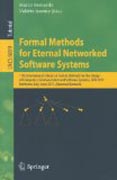
Formal methods for eternal networked software systems: 11th International School on Formal Methods for the Design of Computer, Communication and Software Systems, SFM 2011, Bertinoro, Italy, June 13-18, 2011, Advanced Lectures
Bernardo, Marco
Issarny, Valerie
This book presents 15 tutorial lectures by leading researchers given at the 11th edition of the International School on Formal Methods for the Design of Computer, Communication and Software Systems, SFM 2011, held in Bertinoro, Italy, in June 2011. SFM 2011 was devoted to formal methods for eternal networked software systems and covered several topics including formal foundations for the inter-operability of software systems, application-layer and middleware-layer dynamic connector synthesis, interaction behavior monitoring and learning, and quality assurance of connected systems. The school was held in collaboration with the researchers of the EU-funded projects CONNECT and ETERNALS. The papers are organized into six parts: (i) architecture and interoperability, (ii) formal foundations for connectors, (iii) connector synthesis, (iv) learning and monitoring, (v) dependability assurance, and (vi) trustworthy eternal systems via evolving software. State-of-the-art presentation of the field of eternal networked software systems. Written by leading researchers in the field. Self-contained chapters on various subtopics of eternal networked software systems. INDICE: Interoperability in Complex Distributed Systems.-The CONNECT Architecture.-Automated Verification Techniques for Probabilistic Systems.-Modelingand Verification of Components and Connectors.-Application-Layer Connector Synthesis.-Context Synthesis.-Middleware-Layer Connector Synthesis: Beyond Stateof the Art in Middleware Interoperability.-Introduction to Active Automata Learning from a Practical Perspective.-Model-Based Testing and Some Steps Towards Test-Based Modeling.-Learning of Automata Models Extended with Data Dependability and Performance Assessment of Dynamic CONNECTed Systems.-Security and Trust.-Modeling Spatial and Temporal Variability with the HATS Abstract.-Behavioral Modeling Language.-Kernel-Based Machines for Abstract and Easy Modeling ofAutomatic Learning.-Modeling Secure Systems Evolution: Abstract and Concrete Change Specifications.
- ISBN: 978-3-642-21454-7
- Editorial: Springer Berlin Heidelberg
- Encuadernacion: Rústica
- Páginas: 527
- Fecha Publicación: 03/06/2011
- Nº Volúmenes: 1
- Idioma: Inglés
